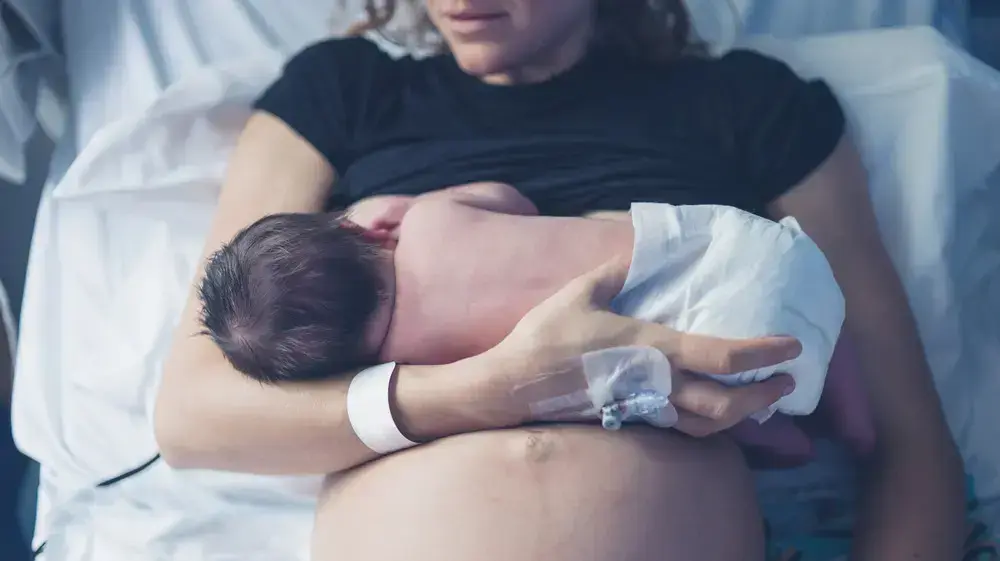Boys who are born of low weight are more likely to have fertility problems later in life
As if life is not that simple, now a study from Denmark has found that low birth weight can impair male fertility later in life. why is it happening?
Boys who are born of low weight are more likely to have fertility problems later in life
Hugh reclamationIn the video: A baby claps in the womb
Fertility problems in men are a topic that has been extensively researched over the past decade, and recent disclosures show that already during pregnancy there are factors that may affect their fertility. A study published in the journal Human Reproduction found that low-weight men were more likely to have trouble bringing up their own children.
Researchers in Denmark examined 5,594 men and 5,342 women who were born between 1984 and 1987 and continued to follow them until their maturity at the end of 2017, when they were, on average, 32 years old. They found that men born under 3 pounds (at 40 and over in pregnancy) had a 55 percent increased risk of infertility later in life, compared to men born at the appropriate age range. Although 5.7 percent of men are expected to have fertility problems in a normal population, among those born in low weight the number has risen to 8.3 percent. However, no association between birth weight and fertility was found in women.
More in Walla! NEWS More in Walla! NEWSMale Fertility: When Do You Start to Suspect a Problem?
To the full articleResearcher Anne Thurst, from the Department of Public Health at the University of Aarhus, Denmark, said: "A suboptimal breeding environment for the fetus, for whatever reason, may itself impair the development of sperm and reproductive organs." She also speculated that her maternal health and lifestyle during pregnancy could affect both fetal growth and the development of reproductive functions. "For example, we already know that if the mother smokes, it can affect the fetus." According to the study's authors, the results show that sometimes one has to look at the earliest life to find explanations of health problems that occur later in life.
More in Walla! NEWS
Seven Things That Can Affect Unhealthy Eating Fertility? How It Affects Your Fertility Israeli Patent For Home Use Ending Baldness Issues Of Both Species Promoted ContentThe weight range of babies born after full pregnancy (40 weeks) ranges from about 2.5 to 4.5 pounds, so in the present study, babies born less than 3 pounds were defined as infants and weighed less than 90 percent of children at the same gestational age.
What happens in the womb affects our continued life. Mother breastfeeding New Born baby (Photo: shutterstock)
Woman breastfeeding Newborn immediately after birth (Photo: ShutterStock)
Previous research has suggested a link between poor uterine growth and two to three times increased risk of genital or reproductive problems in boys, such as hypospadias which is a common birth defect expressed in complete urethral closure or a testicular testicle that does not descend into the scrotum. Such conditions are also associated with infertility.
In the present study, when the researchers excluded men born with hypospadias or testicular testicles, the association between low birth weight and gestational age and infertility was weakened. "This may indicate that part of the relationship between pregnancy weight and infertility is affected by these two problems, which are known to be associated with infertility at a later age."
Mothers of all participants filled out a questionnaire during pregnancy that asked about factors that could affect outcomes, such as age, body mass index (BMI), alcohol drinking, smoking, and socio-demographic status, so other factors could be ruled out. Researchers said participants had not reached the end of their reproductive life in 2017, so they want to see what the situation will be in ten years.
Pregnancy also affects sperm count. Seed swimming towards egg (shutterstock imaging)
Seed swimming towards egg (Photo: ShutterStock)
This is not the first study to find that there is an effect on male fertility already during pregnancy. A study published in the scientific journal Reproductive Medicine Journal Human Reproduction last June found that men whose mothers experienced stressful life events during pregnancy may suffer from low sperm count in adulthood.
The study found that 63 percent of men who were exposed to stressful life events that included the death of a family member or close friend, marital, divorce, or child problems early in pregnancy had low sperm counts and poor sperm quality compared to men who did not suffer from stressful events during the period. Pregnancy, or later stages of pregnancy. The study was intergenerational, and included 2,804 women from 1989-1991. The women completed questionnaires covering a variety of topics, including stressful life events, when they were at week 18 of pregnancy and again at week 34.



/cloudfront-eu-central-1.images.arcpublishing.com/prisa/AR4TPPVGS5HKNAVGMCEWHZZT64.jpg)





